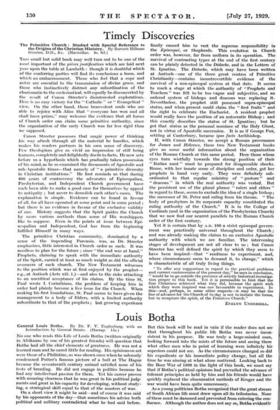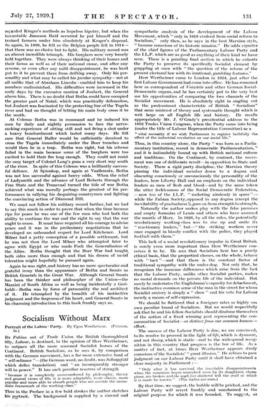Louis Botha
No one who reads this Life of Louis Botha (written originally in Afrikaans by one of his greatest friends) will question that Botha had all the chief elements of greatness. He was not a learned man and he cared little for reading. His opinions on art were those of a Philistine, as was shown once when he solemnly condemned Potter's famous picture of a bull at The Hague because the seventeenth century animal satisfied none of his tests of breeding. He did not engage in politics because he had any intellectual passion for them. Yet his career proves with amazing clearness that he was great in his political judg- ments and great in his capacity for developing, without study- ing, a strategical skill equal to that of the masters of war.
On a short view it might be said—and of course it was said by his opponents of the day—that sometimes his advice both political and military contradicted what he had said before. But this book will be read in vain if the reader does not see that throughout his public life Botha was never incon- sistent in his purpose. lie was truly a large-minded man, looking forward into the mists of the future and seeing there what other men who in point of learning were infinitely his superiors could not see. As the circumstances changed so did his expedients or his immediate policy change, but all the time he was aiming at what alone mattered. Looking back to the Boer War of 1899 in the light of this book, we must say that if Botha's political opinions had prevailed the advance of tolerant principles as held by him and his friends would have quickly replaced the obscurantist methods of Kruger and the war would have been quite unnecessary.
As a young politician Botha recognized that the great stream of South African life must draw upon all its tributaries. None of these must be dammed and prevented from entering the con- fluence. Although the author does not say so, Botha evidently regarded Kruger's methods as hopeless bigotry, but when the lamentable Jameson Raid occurred he put himself and the trained farmers under him absolutely at Kruger's disposal.
So again, in 1899, he felt as the Belgian people felt in 1914— that there was no choice but to fight. His military record was an almost incredible triumph. His burghers were very loosely held together. They were always thinking of their homes and their farms as well as of their national cause, and after any reverse, or even after any mild disappointment, he was hard put to it to prevent them from drifting away. Only his per- sonality and what may be called his jocular sympathy—not at all unlike that of Abraham Lincoln—enabled him to keep his numbers undiminished. His difficulties were increased in the early days by the excessive caution of Joubert, the General above him. There is no doubt that Botha could have occupied the greater part of Natal, which was practically defenceless, but Joubert was fascinated by the protecting line of the Tugela river and had no thought of letting his main body cross it to the south.
At Colenso Botha was in command and he induced his men by daily and nightly persuasion to face the nerve- racking experience of sitting still and not firing a shot under a heavy bombardment which lasted many days. He felt sure that General Buller would be sufficiently deceived to cross the Tugela immediately under the Boer trenches and would then be in a trap. Botha was right, but his scheme failed in the main because some of the burghers were too excited to hold their fire long enough. They could not resist the easy target of Colonel Long's guns a very short way south of the river. In spite of this Colenso was a brilliantly success- ful defence. At Spionkop, and again at Vaalltrantz, Botha was not less successful against heavy odds. When the relief of Ladysmith and the advance of Lord Roberts through the Free State and the Transvaal turned the tide of war Botha achieved what was morally perhaps the greatest of his per- formances in rallying his despairing countrymen and fighting the convincing action of Diamond Hill.
We must not follow his military record further, but we had to say this much in order to prove that when the time became ripe for peace he was one of the few men who had both the ability to continue the war and the right to say that the war ought to cease. It must have required all his courage to advise peace and it was in the preliminary negotiations that he developed an unbounded respect for Lord Kitchener. Lord Milner had a petty conception of a possible settlement, but
he was not then the Lord Milner who attempted later to agree with Egypt or who made Foch the Generalissimo of the Allies. Botha thought that the Boer War had taught both sides more than enough and that his dream of racial. toleration might hopefully be pursued again.
Again he was right, and history has no more spectacular and grateful irony than the appearance of Botha and Smuts as British Generals in the Great War. Although General Smuts has been the thinker and philosopher of the Union—the Mazzini of South Africa as well as being incidentally a Gari- baldi—Botha was by force of personality the real architect of it. He triumphed by the breadth of his instinctive judgment and the largeness of his heart, and General Smuts in kis charming introduction to this book frankly says so.



































 Previous page
Previous page